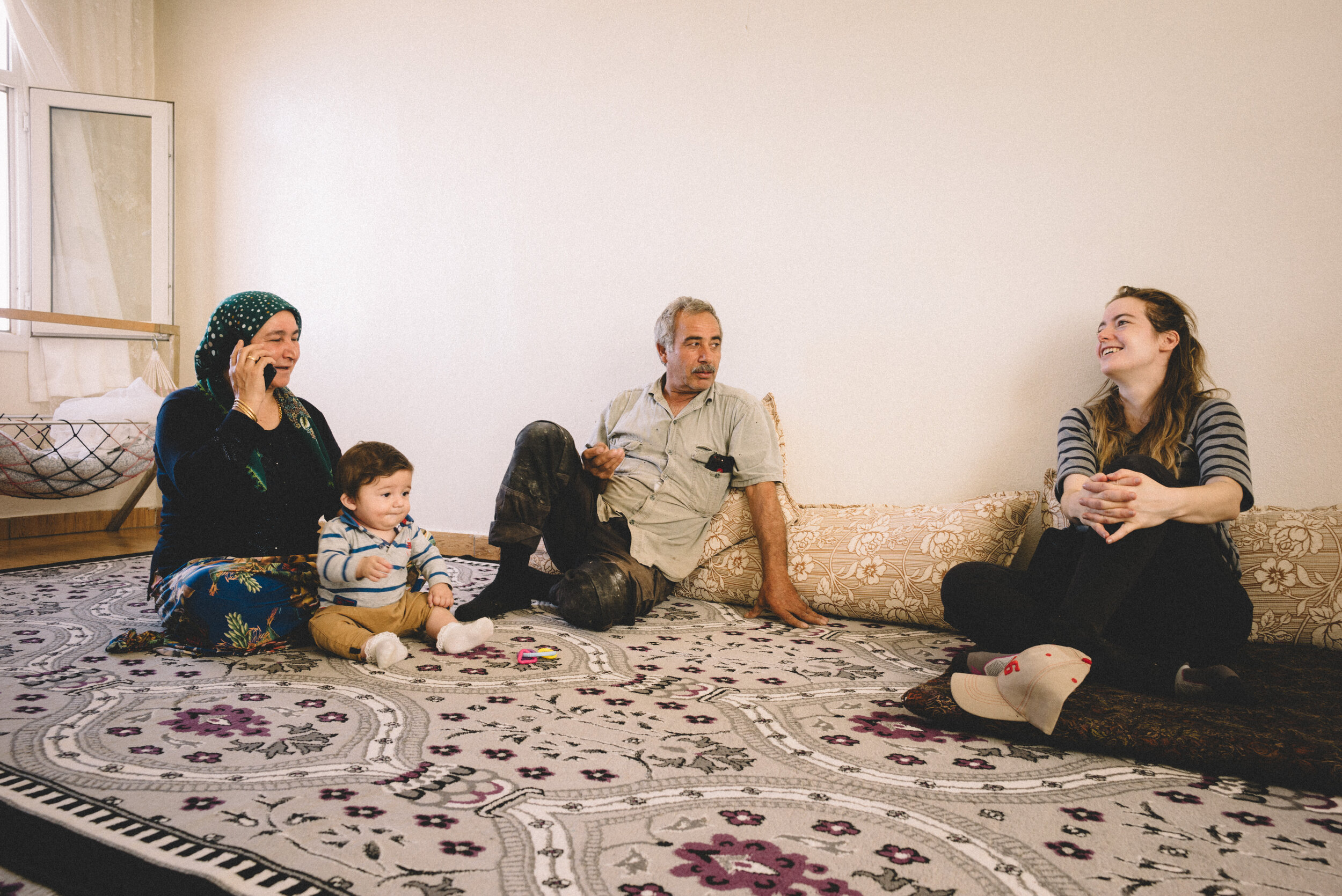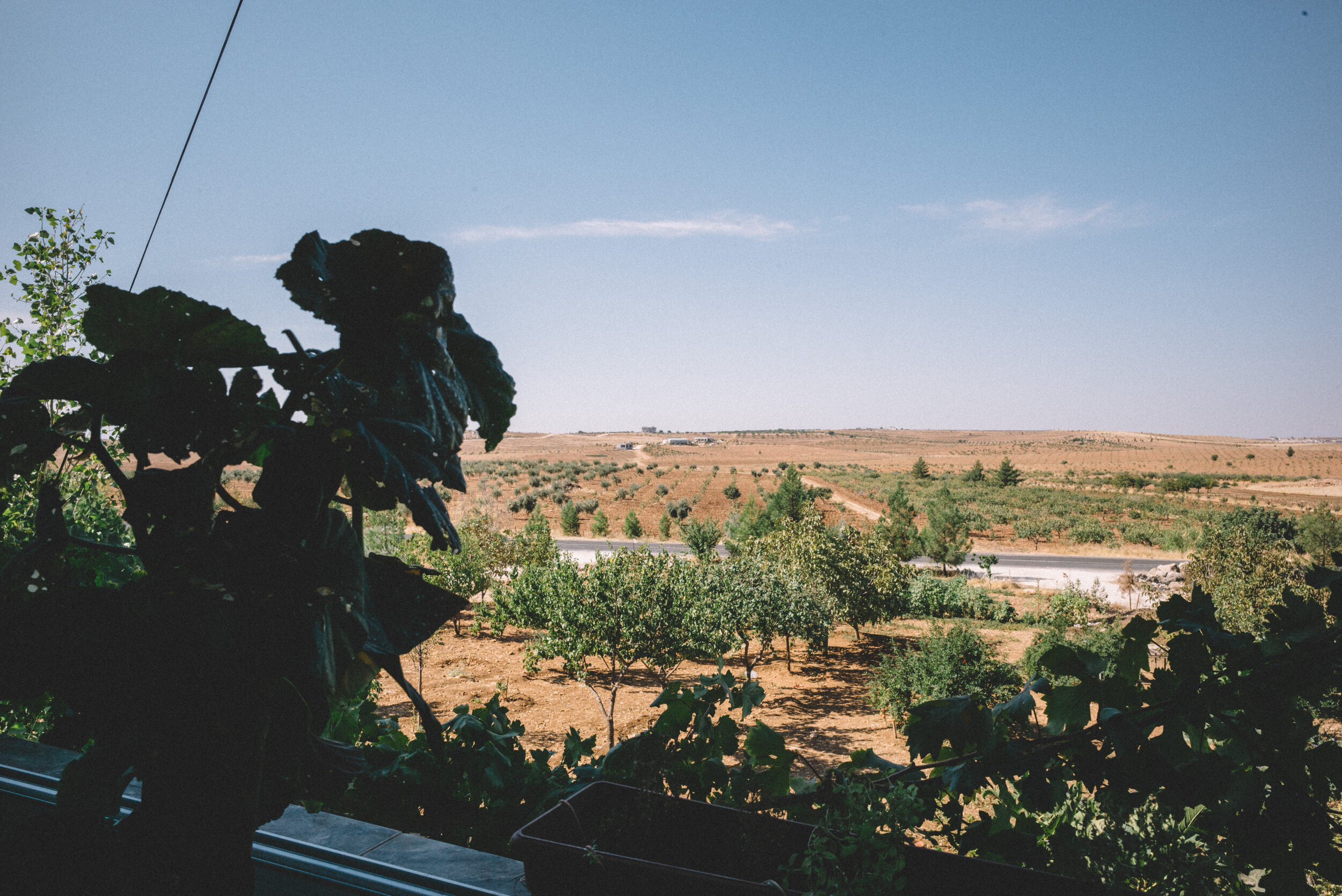3 October 2020, walking Sanliurfa to Suruç
The first break stop on our first hike is a lucky one. We’re perched on a little garden wall in what appears to be a desolate dwelling. The tiny mosque we had passed still bore hint of blue paint, a few chickens hop around. I’m mentally preparing myself for the first faltering introductions and awkward stares, but the firm man north of middle-age that has come to check us out actually knows of an Ibrahim - so surely, we’re looking for this one, who is then summoned to the town’s outskirts.
Ibrahim Arslan speaks French. He spends most of the year in Paris, with his family, and comes down for the harvest and the summer holidays. “We are doing well in Paris,” says the 69-year-old. He has lived there for thirty years and works there as a contractor. He is in demand for renovation and decoration jobs: elaborate stucco, faux-wood or faux-rock walls, that sort of thing. The family home in southern Turkey is beautiful, the upstairs dining room has a beautiful view over the fields. “That is all private land, we grow all kinds of things here. We come back from France a few times a year, for the harvest and the house. ” And to feel like a king, I think.
“On est bien içi”, says one of his two sons Yusuf: “We’re good here, we’re good there.”
A second full breakfast to show us what a wealth in the ground belongs to them: olives, tomatoes, peppers…
I talk to the young men about their double lives, in France and Turkey. They may feel more at home here, to know that the land is theirs to work on and build on, to have their children grow up on - eventually, to lay their parents to rest. From here, it is but a short way from Kobani - “It's on the other side of those hills”, one of the men points. We are seated in the living room, and from the large dining table the full-glass front allows a near 360-view of what is situated beyond this family settlement and its fields.
Kobani got its portion of macabre glory, most recently with the siege that was launched on the major town in 2014 by the Islamic State.
“It has been exciting here,” is the understated description. “You know, when Kobani fell under ISIS, we could hear the bombs here, warriors walked the road here.” The Arslan family members had nowhere to go that fall: “What, go to France and leave our country behind? That would not have been an option, we had to keep an eye on our property.”
We tell about our plan and where we want to continue walking. The motorway is the best option, everyone at the table says. We ask to doublecheck of there is no other way than to walk along the road. We’d prefer a more natural, less noisy environment to travel through. What about the fields? “You mean the farm acres? You are lucky that so far you have ran into us and no dogs. ” I ask in a small voice - Daniel gives me a quasi-relaxed look - if there are many guard dogs in the area. Five people at the table: "YES." "And you don't keep these on your lap, they continue to bite."
This is a discussion we will keep on revisiting during multiple treks: do we follow the road? We’re not planning to hitchhike the kilometer of this stage, but it proves difficult to escape the tarmac. More often than we’re actually happy with, we settle with a stroll along the highway, attempting to avoid hurdling trucks.
Months later Yusuf Arslan sends me some phone snapshots. They show the familiar blues (hot, hot horizon stretched out in front, the clear sky over us) and yellows (dried-out fields and hay) and perched between them two human figures. If you’ve seen the two of us stamp down a road before, it’s easy to recognize Daniel and myself from the backpacks and the height difference. They show the moment after the Arslan brothers had driven us back to the intersection where the family’s driveway joins the highway so we could continue our walk. Clearly, the two young men had stood by the car for an extra minute or two, presumably to make sure that the hikers’ resolve had not flowed back out of our spines at the sight of the bank and the trucks whirling past.
RECAP TREK NOTES from Sanliurfa to Suruç, Suruç to Birecik, and other hikes in October 2020:
The unkind neighbour
Yusuf Arslan told us: “You are lucky you ran into us, that you walked into our village. This is early in your travel project. So you have to keep in mind, please: other people won’t probably be so kind. But it is very important to us, to be kind. We want to show it.”
The remark is eerily similar to what Ahmet told us as we were getting ready in Suruç, hoisting our backpacks up once more after our lovely stay with his family. He called out from the kitchen: “Lisa! Daniel!” Then he held out his cellphone. On the screen of a translator app we could make out, “Be alert and careful in the next villages.”
And so we have moved, from unkinder neighbor to unkinder neighbor and everywhere we went were smothered in hands raised in greetings, drowned in steaming hot teas, filled to bursting with second or third breakfasts. Each one of these hosts would tell us how grateful they were, we all were, how much fun to have these unexpected visitors - but just know, the town up yonder is hostile. The people one-over lack warmth. Every step would bring us closer to yet another less-hospitable group, less trustworthy, less open. And every time we arrived it was in open, excited arms. (And sometimes literally, which truth be told and in a time of pandemic, would freak me out.)






